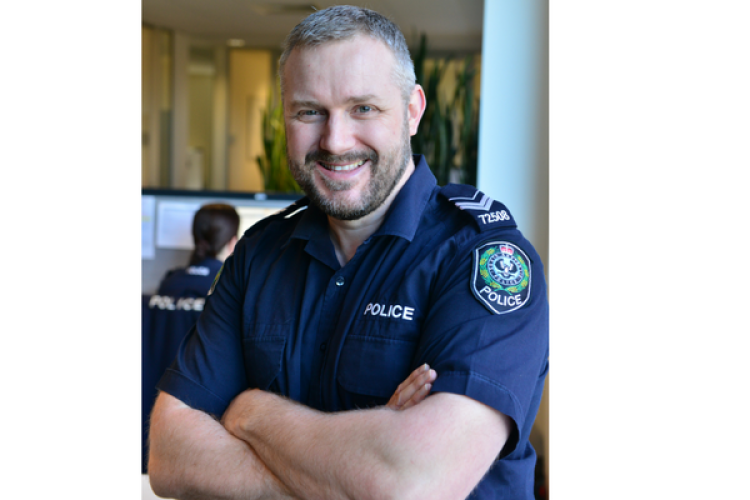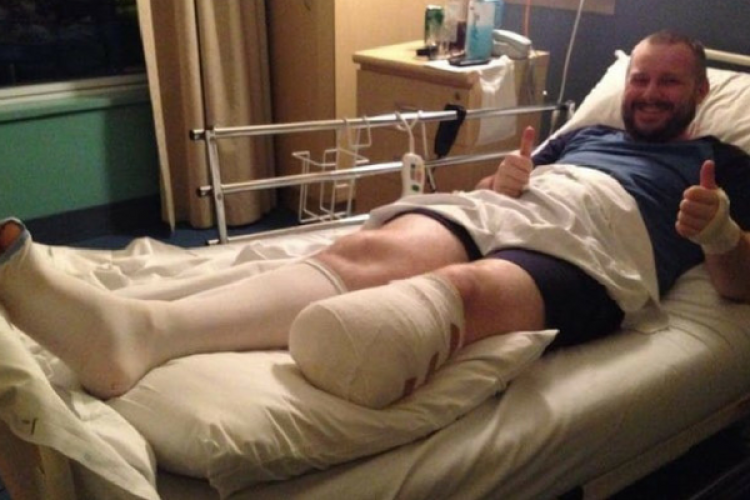- Home
- |
- About us
- |
- News and Events
- |
- Resources
- |
- Contact
- |
- Donate today
- Shop

Robert is an amputee, father of two, and a proud serving member of South Australia Police (SAPOL). Robert and his family come from Northumberland, in the North East of England.
Robert and his wife Julie were high school sweethearts and met when they were just 14 years old. They attended the same University in Bangor, North Wales and were married in their final year of University when they were both just 21!
After completing University, Robert and Julie returned to their home town of Ashington to settle down and start their careers and lives together. Robert had obtained an Honours Degree in Economics, but there were not many job opportunities in their local area, so he made the decision to change career direction and try an entire different line of work.
“I saw that the local police were recruiting and knew that it would be a secure job with good options for career progression,” Robert said.
He applied and for the nine years that followed, Robert worked as a police officer progressing to the rank of Sergeant in Northumbria. However, getting a job as a Midwife proved difficult for his wife Julie, so they started to look for work elsewhere.
“Around that time, we had friends who had moved to Adelaide and joined South Australia Police who were actively recruiting UK police officers and we were aware that various hospitals in Adelaide were also looking to hire more midwives,” Robert said.
So, Robert, Julie and their boys Charlie and Ben packed their bags and moved ‘Down Under’.
“We immigrated to Adelaide in September 2007. Our boys were aged seven and nine. It was a huge leap of faith as I had already resigned from my job in the UK and we had never been to Australia before,” Robert said.
“I applied to SAPOL, got accepted and offered a position. Julie applied for Midwifery jobs and was offered a job at the Women’s and Children’s Hospital. We knew that the move would provide a better future for ourselves and our children.”
Things where looking up for the new arrivals but in October 2013 Robert and a group of colleagues took part in a training exercise known as ‘True Grit’. What was meant to be a fun day out ended up being the ultimate challenge for Robert and his family.
“‘True Grit Night Attack’ was an army style assault course that my colleagues and I took part in outside of working hours for a bit of fun. We were nearly at the end of the course when we had to climb over a wooden climbing wall. I helped to boost my team members over the wall and I was the last to get over the obstacle. I ran up the wall, grabbed the top of the wall, and as I was swinging myself over a colleague’s head popped up into view. He had come to help pull me up, but he popped up as I was moving over the wall. My plan was going to be to hang and drop, but I would have kicked him in the face and knocked him backwards off the wall,” Robert said.
“Without thinking I ended up moving over the top of him and ended up in in free fall. I landed awkwardly on the ground with my whole-body weight going through my left leg rather than landing on both feet. There was grass on the ground but was as hard as concrete. As a result of the way I landed, I sustained a compound fracture of my left tibia, fibula and ankle.”
Following the fall, Robert was taken to the Royal Adelaide Hospital where he underwent multiple surgeries and procedures as doctors tried to deal with the complications of his injuries and to save his leg.

“After being discharged from hospital my leg wound became infected and the wound continued to break down, so I had to undergo plastic surgery where they did free flap surgery. The surgeons took the gracillis muscle from my left leg and transplanted it into my lower leg in an effort to close the wound. They also removed 4cm of my tibia bone that had died and temporarily filled it with cement,” Robert said.
Months later Robert had further surgery to try to close the gap in his tibia. Unfortunately, the surgical procedures were not successful, and Robert ended up with a titanium rod through his heel and through the middle of his tibia bone. His ankle was fused.
Robert was able to walk with a walking stick, but he experienced significant ankle pain. In October 2015, Robert was given the option to have elective surgery to increase his quality of life.
“I desperately wanted to be an operational police officer again. I made the decision to amputate my leg because the ‘re-constructed leg’ was a hindrance. It was painful and significantly disfigured. I was unable to do the things that I wanted to do in life, both personally and professionally in the workplace,” shared Robert.
After Robert’s wound healed he was able to start the process of being fitted with a prosthesis. Robert attended the Repatriation Hospital Amputee Clinic in Adelaide where he re-learned to walk. “People can’t tell which leg my prosthetic is,” Robert laughed.
Robert’s intense rehabilitation paid off. Finally, in August 2017 he became the first amputee to be declared a fully operational police officer in South Australia Police. In September that same year Robert won the Self Insurers of South Australia (SISA) award for ‘Outstanding Personal Achievement in Return to Work’.
Robert credited the success of his recovery to the support he received from his family, friends, colleagues and healthcare providers.
“My wife (Julie) was my rock. I couldn’t have stayed so positive without her. My employer was wonderful, and my colleagues made sure that I stayed smiling; they made me laugh, especially when I was having a tough day, or week. It was good to be at work as it got me out of the house and interacting with other people again. Professional support from physiotherapists, prosthetists, surgeons and allied healthcare staff was invaluable,” Robert said.
Robert now works full-time within the police intelligence section and is enrolled in a Masters Degree in Intelligence, Policing, Cyber-Security and Counter Terrorism. To keep fit he enjoys long walks with his family, exercise and practices yoga.
Robert says his amputation is a new experience and a big learning curve. He affirms that maintaining a positive mindset can make a huge difference in the recovery process
“Losing a limb is like losing a loved one. A process of grieving occurs, and it needs to happen. It is natural to cry, it is natural to feel a little bit low on occasions, but it is important to come out of the other side, as life does go on,” he said.
“I would rather lose my leg than have something happen to my kids. In reality, there are people around the world who are in that situation. I would rather be in my situation. There is always someone worse off.”
Robert’s advice to his fellow amputees is to stay positive, set some goals, listen to the professionals, interact with others and most importantly, not to take your family for granted.
Robert is participating in the Limbs 4 Life Peer Support Volunteer Program to provide support and assistance to new amputees and their families. We welcome Robert to the team.
Keep up to date with our latest news, events and information